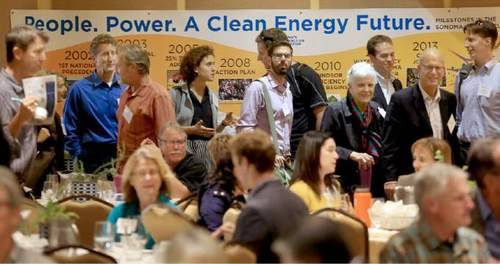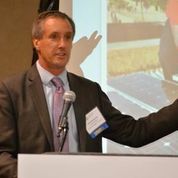The Business of Clean Energy Symposium held on Oct 23 in Petaluma, CA, featured green tech experts from around California and across the country. The event, sponsored by the The Climate Center, revealed opportunities arising from the Community Choice utilities that are literally gaining steam in California. Government agencies from across California reviewed the striking success of Marin Clean Energy (MCE), especially that agency’s recent rapid increase in signing renewable energy contracts with local sources. A second new agency, Sonoma Clean Power (SCP), warranted special attention at the Symposium because during its first six months of operation it turned a seven million dollar debt into a five million dollar cash positive position. The success of these agencies is inspiring other California communities to take up the community choice utility challenge, a path that promises lower utility rates and a greener mix of energy for electricity consumers.

In Marin Clean Energy’s first three years of operation the agency signed only one renewable energy contract with a local supplier. But in its fourth year, MCE evolved rapidly, concluding eleven local energy projects. Meanwhile, MCE’s purchase of 177 megawatts of renewable energy capacity outside of their service area has created more than 1800 jobs. Marin has expanded its geographical service area from Marin County to the City of Richmond, a diverse, working class community which across San Francisco Bay from Marin’s upscale enclave. MCE reports that the percentage of Richmond customers opting out of their service is lower than in Marin County. Notably, the percentage of Richmond customers opting to pay a premium price for MCE’s 100% renewable energy product is also higher than MCE’s Marin base.
A coalition of groups that fought against California legislative bill 2145, which would have made traditional investor owned utility companies (IOUs) the default electricity provider when Community Choice is established, are now cooperating to expand the adoption of the new community choice agencies statewide and beyond.
The Local Energy Aggregation Network (LEAN), a group focused on promoting community choice, tracks communities across the six US states where community choice agencies are allowed by statute. Shawn Marshall, the group’s director, points out that while other states like Illinois have more community choice utilities, California’s agencies uniquely pursue fighting climate change, and thus increased use of renewable energy, as part of their business mission.
Jigar Shah, who established the pioneering solar company SunEdison and also ran Richard Branson’s Carbon War Room, spoke to attendees of the high likelihood that renewable energy could be almost universally adopted in the USA by 2030. He emphasized the structuring of new businesses in the sector to meet demanding bank loan standards, thus ensuring large scale financing of the green tech market.
Robyn Beavers, Sr. VP at NRG Energy, spoke of the development of a “multi-dimensional” energy market, where diverse local and technological innovation could transform the energy landscape.

David Hochschild, a member of the California Energy Commission, also predicted the fast and widespread adoption of solar and other renewables. He likened the current situation to early forecasts for cell phone use made in the late 1980s, forecasts that vastly underestimated an adoption rate that has now led to seven billion cell phones now being used worldwide. Hochschild sees the adoption of solar and other renewables as entering a period of similar explosive growth.
Guest Writer Andy Ferguson
Check out Andy’s website and blog Net Zero Made Simple